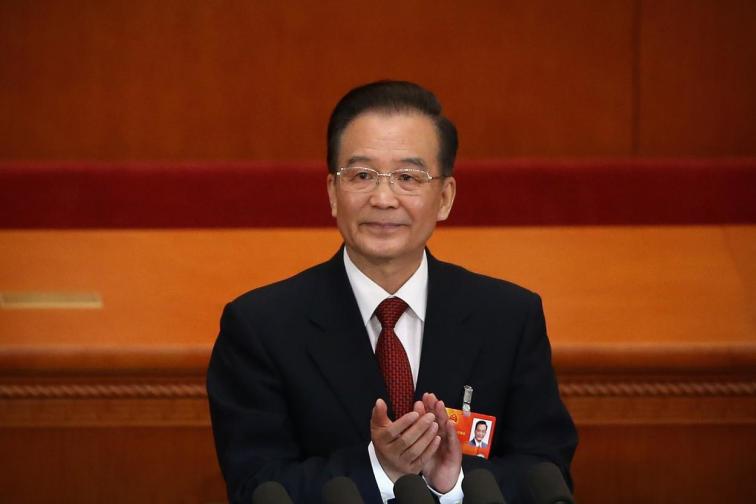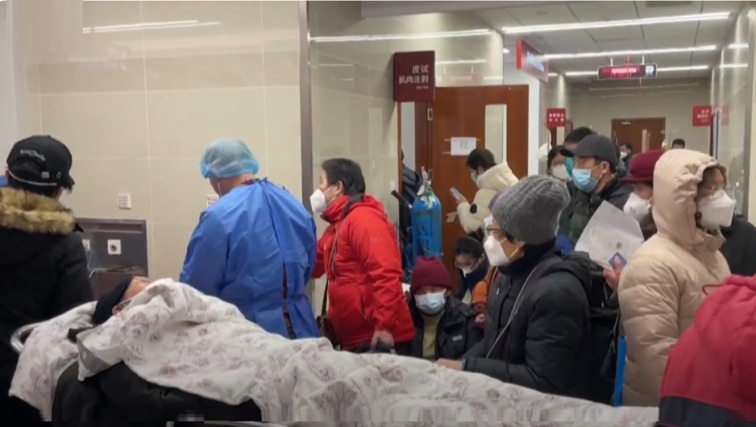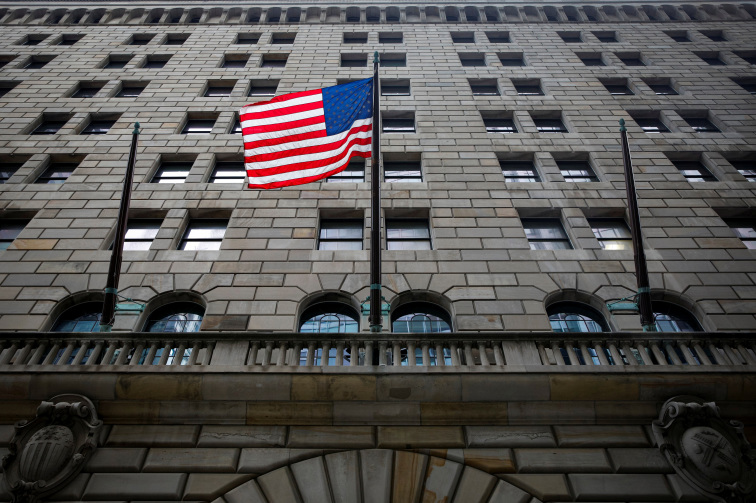During the 2025 May Day holiday, many tourists in China chose not to spend. Vendors across various regions lamented, “There are lots of people, but they’re not buying.” The image shows street scenes in Shanghai during the holiday (video screenshot).
[People News] On June 16, China’s National Bureau of Statistics (NBS) released data on the implementation of the national economy for May. NBS spokesperson Fu Linghui continued with his scripted optimism, proclaiming that the "economic foundation is solid, advantages are numerous, resilience is strong, and potential is great," and that the trend toward “positive development” has not changed.
Fu added, “These are the sources of confidence and strength for China’s economy to overcome various risks and challenges.” In reality, China's economy now relies heavily on the NBS, which fabricates data to cover up problems and praise the regime. The bureau has effectively entered the "big data bluffing" era.
Contradictory Data Expose a Battered Economy
According to official data, China's industrial output rose 5.8% year-on-year in May 2025, and 0.61% month-on-month. Equipment manufacturing increased by 9.0%, and high-tech manufacturing grew by 8.6%. For the first five months of the year, overall industrial output rose 6.3%. Fu boasted that "industrial production grew steadily, with rapid growth in equipment and high-tech manufacturing."
The figures seem promising — at least on paper. But by comparing them with other indicators, the illusions quickly unravel. The Manufacturing Purchasing Managers’ Index (PMI) for April and May 2024 was 49% and 49.5%, respectively — below the 50% threshold signaling contraction. Between January and April, total profits of large-scale industrial enterprises reached 2.117 trillion yuan, up just 1.4%. So, while output rose, profits remained in the doldrums, signaling cutthroat price competition. The production-sales ratio in May was 95.4%, down from 96.6% a year earlier. This aligns with falling PPI data, confirming the economy is sliding into deflation.
On June 20, China’s National Energy Administration reported May’s electricity consumption: total social electricity use reached 809.6 billion kWh, up 4.4% year-on-year. However, the industrial sector (second industry) used 541.4 billion kWh — just a 2.1% increase, which is 2.3 percentage points below the national average. For January-May, electricity consumption rose 3.4% overall, while the industrial sector grew only 2.2%. Former Premier Li Keqiang has passed, but his so-called “Li Keqiang Index” — an alternative economic measure — continues to diagnose deep economic malaise.
Notably, 3D printing equipment, industrial robots, and new energy vehicles saw year-on-year output increases of 40.0%, 35.5%, and 31.7%, respectively — a result of state subsidies acting like temporary stimulants. But with mounting debt at both central and local levels, state finances are drying up, and the government is forced to borrow continuously. This unsustainable practice is wearing thin. In May, high-tech manufacturing growth slowed from 10% to 8.6%. Railway, ship, aerospace, and other transport equipment saw growth drop from 17.6% to 14.6%, while electrical machinery fell from 13.4% to 11%.
On June 20, the Ministry of Finance reported that national tax revenue for the first five months totaled 7.916 trillion yuan — a 1.6% year-on-year decline. Central government general budget revenue was 4.1486 trillion yuan, down 3%.
People's Lives Are Becoming Poorer: The Xi-Style Deflation Cycle Deepens
The NBS claimed that May’s total retail sales of consumer goods hit 4.1326 trillion yuan, up 6.4% year-on-year. State media pounced on this as proof that consumption was rebounding.
But does this mean consumers suddenly have more money? Clearly not. The surge came largely from government-subsidized “trade-in” incentives for items like electronics and furniture, with related sales rising from 28.5% in April to 34.1% in May. As rumors of a coming end to subsidies spread, consumers rushed to buy before the cut-off — an artificial, unsustainable bump.
The public has long learned to outsmart the regime: take the bait, avoid the hook. If there’s no subsidy, people simply don’t buy. For essentials like food, beverages, medicine, daily necessities, and clothing — which received no subsidies — sales grew only 6.1%.
Xi Jinping once famously said, "What's wrong with deflation? Don't people like cheaper prices?" And indeed, as Xi wishes, the CPI has dropped month after month in 2025. In May, the Consumer Price Index fell 0.1% year-on-year and 0.2% month-on-month.
Think cheaper prices mean life is easier? That goods will sell better just because they’re not more expensive? Xi's logic might win him a mock Nobel for economic absurdity.
In reality, essential living costs — rent, healthcare, education, utilities — continue to rise. Prices for pork and fruit are also climbing. Yet the CPI remains low due to a lack of transparency in its weightings and basket composition — many rising costs simply aren’t included.
More importantly, incomes are not rising. Over 12.2 million college students will graduate this year, joining 6–7 million jobless graduates from last year. Nearly 20 million young people face joblessness. One university in Sichuan reported a 0% employment rate for PhDs and only 27% for Master’s students. A top-tier university in Beijing saw a 30% employment rate. Add to that 300 million migrant workers struggling to survive.
The whole society is trapped in a liquidity crunch. Money stays in the banks. No one wants to spend or invest. In April, new loans totaled only 280 billion yuan, 450 billion less than the same time last year — a 90% drop from March's 3.64 trillion. It was the lowest level since mid-2023. M2 money supply grew 8.0% year-on-year, but M1 only grew 1.5%, showing a huge 6.5-point “scissors gap” — a sign that liquid cash is vanishing from the market. May data didn’t improve much, with new loans at 620 billion yuan, down 330 billion from the previous year. M2 growth was 7.9%.
The Government Is Also Struggling: Control the Mouth, Save the Economy?
On May 18, the CCP Central Committee and State Council issued a revised Regulations on Party and Government Agencies Practicing Thrift and Opposing Waste, which included the strictest anti-alcohol ban in history. Local governments quickly followed suit, issuing even stricter policies. Some places now ban gatherings of more than three public officials. Netizens mocked: “Eating alone is hedonism, two people is an affair, three is a clique, and four is a conspiracy.”
After the new alcohol ban, shares of seven liquor companies dropped over 10%, and the price of Feitian Moutai fell below 1,900 yuan per case. The ban reflects more than morality — it’s about financial desperation. In the past, cadres could afford endless banquets with public funds. Now the state is broke and even struggling to pay civil servants, prompting the regime to claw back from its own. State media even began arguing over semantics: is it banning drinking or banning illegal drinking? The doublespeak has become a tongue twister.
Since 2025 began, many regions have slashed civil servant salaries. In provinces like Zhejiang, Shandong, and Guangdong, annual pay for average officials dropped 50,000–60,000 yuan. Officials above division-level lost over 100,000 yuan. Cuts of 15–25% are common, and higher-paid employees face steeper reductions.
Some township civil servants in Shandong are only receiving 70% of their salaries, and payments are delayed. Police salaries in Guangdong dropped from 300,000 to 200,000 yuan — a 33% cut. Some officers’ pay has been halved. Similar reductions of 15–20% are reported in Jiangsu and Fujian. Due to fiscal strain, even affluent regions like Beijing, Shanghai, and Guangdong are facing wage cuts, triggering waves of resignations.
Beyond civil servants, central enterprises and financial regulatory agencies are also cutting pay. Firms like China International Capital Corporation and China Development Bank capped executive salaries at 1 million yuan, with some seeing 50% reductions. Salary cuts were set in early 2025 and are expected to be fully implemented by year-end.
China’s economic and fiscal situation has deteriorated significantly in 2025. The CCP is out of ideas — other than silencing dissent. First, it censors speech and mandates optimistic narratives. Then it deletes or hides key economic data. Finally, it issues alcohol bans.
This is Xi Jinping Economic Thought at work: control the mouth, and the economy will follow.
(First published by People News)











News magazine bootstrap themes!
I like this themes, fast loading and look profesional
Thank you Carlos!
You're welcome!
Please support me with give positive rating!
Yes Sure!